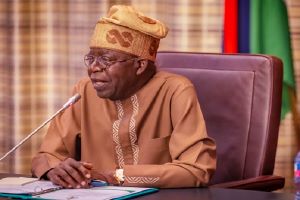Nigerian President, Bola Ahmed Tinubu has stated that Nigeria would have gone bankrupt if he had not intervened by removing the fuel subsidy.
Tinubu made the assertion at the Special World Economic Forum in Riyadh, Saudi Arabia on Sunday.
He, however, said though the policy came with economic pains, it was in the best interest of Nigerians.
Recall that Tinubu during his inaugural speech as President of Nigeria on May 29, announced the removal of subsidy of petroleum.
Announcing the removal, he said the move would save money for the government to embark on infrastructural expansion.
But the move, however, sparked collateral instability in the value of the Naira and lingering hardship on Nigerians as food prices soared.
Speaking at the WEF, Tinubu said he took a good decision in removing the fuel subsidy. He said removing the petrol subsidy was a “necessary action for my country not to go bankrupt” and to “reset the economy towards growth.”
The Nigerian President, however, acknowledged the difficulties posed by the decision. He told attendees that his government implemented parallel arrangements to cushion the impact on vulnerable citizens.
“Yes, there have been drawbacks. Yes, there was the expectation that a greater number of people would feel the difficulty. But, of course, I believed it was their interest that was the focus of government.
“It is easier to manage and explain the difficulties. But along the line, there was a parallel arrangement to cushion the effect of the subsidy removal on the vulnerable population of the country.
“We shared the pain across the board. We cannot but include those who are very vulnerable. Luckily, we have a very vibrant youthful population interested in discoveries by themselves. Highly ready for technology, good education, and committed to growth,” he explained.
Tinubu also described the unification of the Naira exchange rates as “necessary”. He said this done to “remove the artificial element of value in our currency.”
“The move,” he argued, “enabled the local currency to find its level. And to “compete with the rest of the world’s currencies, and remove arbitrage, corruption and opaqueness.”
The President also emphasized the need for stability and economic prosperity in West Africa. According to him, “We need to trade with one another, not fight each other.
He recounted the efforts made in his past 10 months as Chairman of the ECOWAS Authority of Heads of State and Government. And how he has used Nigeria’s influence to discourage unconstitutional changes in government and ease sanctions for improved trade and economic prosperity in the region.
The President, however, singled out “the fear of lack of capital in Africa” and “stigmatization” for urgent attention. He said this can be done through inclusive programmes that drive economic opportunity.
Tinubu also emphasized the importance of economic collaboration. He said, “The capital formation necessary to drive the economy, like agriculture, food security, innovation, and technological advancement, must be an inclusive programme of the entire world. No one should be left behind.”
Over 1,000 leaders from business, government, and academia from more than 90 countries were in attendance at the WEF.
source: PUNCH
![]()

